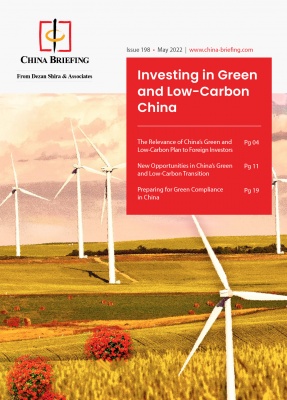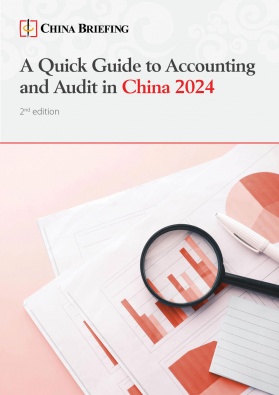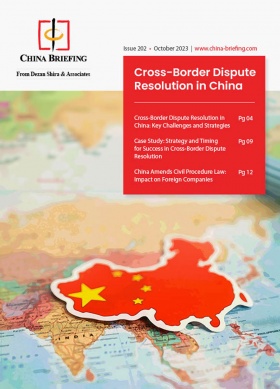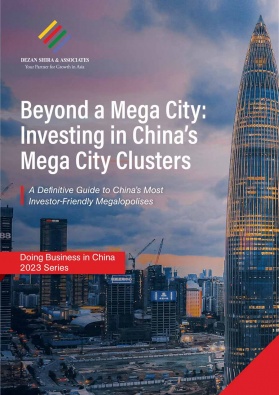UK 2023 Investments into China – Data Analysis on Deals, Values, M&A and Investments
2023’s UK-China investments can be indicative of 2024’s UK investment trends
By Chris Devonshire-Ellis & Henry Tillman
With a reshuffle in the British Government and ex-Prime Minister – and generally pro-China politician David Cameron now as the UK’s Foreign Minister, there have been early signs of a potential mild rapprochement in the British governments overall attitude towards Beijing.
But before people get carried away, we can look at what investments the UK has made into China this year – as investments made while anti-China politics have tended to be the norm are typically indicative of stronger trends. In this report I include unique data that has not previously been made public, and examine the Q1-Q3 investment trends to see what may lie ahead for 2024.
Q1 2023 UK Investment into China
- In June 2020, when Jaguar Land Rover (JLR) was affected by COVID, a consortium of 5 Chinese banks stepped in to provide £559 million in a 3-year facility in funding support. In Q1 2023, after JLR returned to a profit, the Chinese consortium signed a £600 million three-year extension to the 2020 facility, which had been originally scheduled to mature in June 2023.
- Standard Chartered received approval from CSRC to establish a securities unit in mainland China which will have an initial RMB1.05 billion (£123.5 million) capital injection. The latest clearance represents the first of its kind approval granted by CSRC to establish an onshore securities firm.
- Alibaba’s cloud unit collaborated with Royal Dutch Shell’s China subsidiary on green, low-carbon digital solutions, exploring electricity trading, green certificate trading, and carbon credit trading.
Q2 2023 UK Investment into China
- AstraZeneca – nine months after dumping an Ionis-partnered hypercholesterolemia asset, AstraZeneca has teamed up with a self-described “young” Chinese biotech to work on new drugs to target the condition. The three-year agreement will see Shanghai-based Cholesgen receive an undisclosed initial payment from the British Pharmacuetical giant to pursue first-in-class targets and mechanisms for hypercholesterolemia and related metabolic diseases originally identified by the biotech’s Chinese researchers. Cholesgen will also be entitled to further payments—based on an agreed but undisclosed license package—for every candidate that AstraZeneca decides to take into the clinic. Cholesgen was founded in 2021 by leading cholesterol metabolism researcher Bao-Liang Song. The biotech raised £11.2 million in a series A financing round in June, with backers including AZ-CICC Medical Fund, a joint investment fund set up by AstraZeneca and financial services company China International Capital Corporation Limited.
- AstraZeneca were also involved with Shanghai’s LaNova Medicines in a US$600 million deal. AZ has entered into an exclusive license agreement with UK pharma major AstraZeneca (LSE: AZN), for LM-305, a pre-clinical stage antibody drug conjugate (ADC) targeting G proteincoupled receptor, class C, group 5, member D (GPRC5D). AstraZeneca will be granted an exclusive global license to research, develop and commercialize LM-305. The candidate comes to AstraZeneca with Investigational New Drug (IND) approvals already in place in the United States and China. The asset is a good fit for AstraZeneca since the company halted development of MEDI2228, an anti-BCMA ADC for multiple myeloma in 2021. In return, LaNova Medicines is eligible for an upfront and near-term payments of up to US$55 million and additional development and commercial milestone payments of up to US$545 million, as well as tiered royalties on net sales worldwide.
- Arup announced three major initiatives to help co-create a net-zero future for China at the Shanghai International Carbon Neutrality Expo in Technologies, Products and Achievements, the world’s first expo focusing on carbon neutrality. The deal volume was undisclosed. Arup also entered into an MoU with the China-UK Low Carbon College, Shanghai Jiaotong University to advance research and talent development in low-carbon planning, green building design and energy transition in China. The firm also released two China reports, the Chinese edition of the Reduce, Restore, Remove (3Rs) foresight report, which puts the 3Rs into action and looks into the key measures and technologies to achieve China’s ‘dual carbon’ targets, providing a pathway to net-zero for the country, and the Chinese language version of their Post-COP27: Building A More Climate-Resilient Asia position paper, which outlines insights, strategies and resources to help accelerate the Race to Resilience and co-create more sustainable cities.
- China Baowu, the world’s biggest steelmaker, and Rio Tinto, the British-Australian mining company, and the world’s largest iron ore producer, signed a MoU to explore a range of industry leading new projects in China and Australia to help decarbonise the steel value chain. Under the MoU, China Baowu and Rio Tinto plan to jointly advance specific decarbonisation projects, demonstrating their commitment to play a leading role in the industry’s low-carbon transformation. The MoU, signed in Shanghai by Rio Tinto Chief Commercial Officer Alf Barrios, and China Baowu Vice President Hou Angui, follows the recently announced US$2 billion Western Range Joint Venture in the Pilbara region of Western Australia, involving Rio Tinto and Baowu. The projects include: (1) Research, build and demonstrate a pilot-scale electric melter at one of Baowu’s steel mills in China. This will enable low-carbon steel making utilising Direct Reduced Iron (DRI) that has been produced from low and medium grade ores. (2) Optimising pelletisation technology for Australian ores as a feedstock for low-carbon shaft furnace-based direct reduction. (3) Expanding the development of China Baowu’s HyCROF technology which can largely mitigate CO2 emissions from the blast furnace process. (4) Joint study opportunities for producing low-carbon iron in Western Australia. These innovative projects are an outcome of the long-standing collaboration between Rio Tinto and China Baowu spanning 50 years. To progress each initiative, both companies have committed to sharing resources and expertise. Rio Tinto’s Chief Executive of Iron Ore Simon Trott said “China’s commitment to curbing emissions and promoting high-quality green development is strongly aligned with our own position where climate change and the low-carbon transition are at the heart of our strategy.”
Q3 2023 UK Investment into China
- Shell has opened its largest electric vehicle (EV) charging station globally in Shenzhen, China. The charging station is located about 2.5 kilometres from the Shenzhen Airport Terminal and features 258 public fast charging points. It is operated by Shenzhen Shell and BYD Electric Vehicle Investment Company Limited, a JV between Shell and BYD. The Shell Recharge Shenzhen Airport EV Station served more than 3,300 EVs every day during its trial operation. In addition to EV charging, the station offers Shell Select convenience retailing, Shell Café, vending machines, and a drivers lounge. The rooftop solar panels installed at the station could generate about 300,000 kilowatt-hour of renewable electricity per year, which will be used to charge customers’ vehicles. China is one of the most important growth markets for Shell Mobility. In Wuhan, Shell recently opened its Panlong Integrated Energy Station. This station offers more than ten types of mobility products and services, including petrol and diesel, EV charging, hydrogen refuelling, car wash facilities, a convenience store, a restaurant, a drivers lounge, and other services. The station also offers Shell V-Power Racing which was recently launched in China, a fuel formulation designed to deliver 6.25% more power and 5.36% quicker acceleration compared with 92 octane main grade petrol1. The deal value was not disclosed but was likely to be substantial.

Chris Devonshire-Ellis, the veteran China hand, and long-time Chairman of Dezan Shira & Associates. The firm advises UK and other foreign investors into the China market and has done since 1992. It has 12 mainland China offices, one in Hong Kong and has placed about £1.5 billion worth of British SME investments into China.
- Rio Tinto RIO.L, RIO.AX has been solely funding preparatory work at the blocks it holds at Simandou, in Guinea, West Africa. Simandou is one of the world’s largest untapped iron ore deposits, however Rio Tinto’s Chinese partners are yet to make their funds available, two sources close to the matter said. Rio Tinto owns two of four Simandou mining blocks as part of its Simfer joint venture with China’s Chalco Iron Ore Holdings (CIOH) and the government of Guinea, where the mine is located. It has so far spent more than £397 million on developing the project that should have been split with CIOH, due to a delay in the Chinese consortium getting state approval on the financing, the sources said. CIOH is 75% held by Aluminum Corporation of China (Chinalco) and 20% by Baowu Steel Group, with China Railway Construction Corporation (CRCC) and China Harbour Engineering Company (CHEC) each holding 2.5%. “The worry is that if their (Rio’s) partners don’t get approval from China on their funding, the money will deplete,” added one of the sources, who declined to be named because the information is not public. Most Chinese companies are backed or owned by state entities, their financial approvals complicated by convoluted ownership structures amid an economic slowdown that has seen the world’s second-largest economy struggle after a brief post-COVID recovery. With a complex ownership structure, Simandou has been haggled over for years. Rio had earmarked US$800 million for its share of the development in 2023 and around US$2 billion a year in 2024 and 2025.
- CanSino and AstraZeneca form mRNA vaccine collaboration. Vaccine firm Tianjin CanSino Biologics has extended a research alliance to provide contract development and manufacturing services for AstraZeneca’s messenger RNA (mRNA) vaccine program. CanSino, which said it would manufacture and supply unspecified mRNA products to AstraZeneca, has an mRNA candidate that has completed China Phase II trials for COVID. AstraZeneca said the deal would support investigational mRNA vaccines in its early pipeline. In November 2022, the two companies announced they were collaborating to bring rare disease therapies to the China market. Financial details of the latest agreement were not disclosed. In their earlier research collaboration, CanSino and AstraZeneca agreed to develop CanSino’s ACYW135 Meningococcal Conjugate Vaccine (CRM197) for different age groups, develop an MCV4 meningitis vaccine and complement inhibitors in China for related indications and expand R&D to international markets. Headquartered in Cambridge, UK, AstraZeneca claims to be China’s largest multinational biopharma with 2021 revenues of US$6 billion from the PRC market. CanSino has two approved vaccines for COVID: Convidecia, a Recombinant Novel Coronavirus Vaccine (Adenovirus Type 5 Vector) and an inhaled version of Convidecia. It also has an approved vaccine for Ebola along with two vaccines for meningitis. Incorporated in 2009, CanSino has developed five integrated platform technologies – viral vector-based technology, synthetic vaccine technology, protein structure design and recombinant technology, mRNA technology – along with formulation and delivery capabilities. Its pipeline consists of 17 vaccines addressing 12 diseases, including the Recombinant Novel Coronavirus Vaccine (Adenovirus Type 5 Vector) conditionally approved in 2021.
- Intercontinental Hotels : IHG Hotels & Resorts partners with China Duty Free Group offering “shopping + stay” exclusive privileges for members in Greater China. IHG One Rewards, the global loyalty program under IHG Hotels & Resorts (IHG), recently announced its collaboration with CDF on member privileges sharing scheme. Under the partnership, both parties integrate their resource advantages and provide excellent operational standards and service quality to members. This collaboration centers around the thriving tourism and duty-free consumption market in Hainan, covering a range of privileges such as stays at IHG Hotels & Resorts properties and duty-free shopping both domestically and internationally, and creating the ultimate “Stay + Shop” experience for global travelers. Ms. Florence Hu, Chief Marketing Officer, IHG Greater China said, “With 48 years in China and 39 years’ deep involvement in the mainland market, IHG has consistently focused on the diverse needs and immense potential of the Chinese market. Aligned with the national development strategy and seizing the opportunities of dual circulation, IHG understands market trends and consumer demands. We are actively contributing to the growth of China cultural tourism and consumption market. This partnership with CDF members will leverage the Hainan Free Trade Port as a crucial platform for pioneering a new path for the tourism industry. This innovative integration of duty-free shopping with hotel stays will empower Chinese and international jetsetters with a rich array of premium benefits, resulting in a highly-coveted travel experience.” The deal value was not disclosed.
- Johnson Matthey is to build a CCM plant in China for PEM fuel cells and electrolyzers, and signed an investment agreement with the Jiading District in Shanghai to help accelerate the hydrogen economy in China. JM and the Shanghai Jiading District plan to build a new catalyst-coated membrane (CCM) production facility, providing CCM production capability for multiple proton exchange membrane (PEM) fuel cell applications and PEM electrolyzers. The facility which will have an initial capacity of up to 5GW, will occupy 22,000 m2 in the Jiading district of Shanghai, in a designated Hydrogen industrial zone and is due to be operational in 2025. It will have the potential to expand further in line with customer demand. The investment, which is backed by customer demand, is part of JM’s £1-billion global stated capital expenditure for the three years to 2024/25 and will include government support and incentives. The new production facility will enable Johnson Matthey to supply existing Chinese and international customers with locally produced CCMs, and in addition there is a strong pipeline of further customer interest across both fuel cell and renewable (green) hydrogen technologies. CCMs are key performance-defining components in fuel cell electric vehicles (FCEV). China has said it aims to have 1 million hydrogen-powered vehicles on its roads by 2030. JM China is one of China’s leading auto catalyst producers and platinum group metals traders and refiners, and a leading player across syngas and hydrogen fuel cells. JM was the first commercial-scale membrane electrode assembly (MEA) producer in China, producing the MEAs for hydrogen fuel cell shuttle buses showcased in the Beijing Winter Olympics 2022.
- Pheon Therapeutics (UK) has entered into a license agreement with Beijing based Biocytogen Pharmaceuticals. Pheon Therapeutics (Pheon), is a leading Antibody-Drug Conjugate(ADC) specialist developing next generation ADCs for a wide range of hard-to-treat cancers, and announced an exclusive licence agreement with Biocytogen Pharmaceuticals (Beijing) Co. Ltd. Biocytogen is a global biotech company focused on the discovery of novel antibody therapeutics. Under the terms of the agreement, Pheon will develop and commercialize an antibody developed using Biocytogen’s proprietary RenMiceTM platforms. Biocytogen will receive an upfront payment and is eligible for development and commercial milestone payments as well as single-digit royalties on net sales. The new agreement expands Pheon’s ADC pipeline which boasts first-in-class and best-in-class ADCs to meet significant unmet clinical needs in oncology. Pheon launched in March 2022 with a £54 million Series A financing led by a strong leadership team of specialists in targeted oncology therapies and ADCs. Biocytogen’s proprietary RenMiceTM platforms feature the complete replacement of human antibody variable genes in situ. The platforms, together with target knock-out strategy empower the generation of fully human antibodies with low immunogenicity, great diversity, species cross-reactivity, high affinity and good developability. RenMice platforms and derived antibodies have been recognized by many renowned biotech and biopharmaceutical companies. The deal value was not disclosed.
Summary
As can be seen, UK investment into China during 2023 has concentrated in very specific sectors – almost exclusively in renewables, EV, pharma, global healthcare, international mining, and China’s high value consumer markets in both financial services and tourism.
What is of note, and not generally appreciated is the increasing trend towards UK businesses partnering with Chinese SOEs in non-China projects, although the experience of Rio Tinto this far in Africa shows that patience is required when dealing with the Chinese government as defacto partners – if possible, they will pass on the initial risk capital to the foreign partner. That said, impressive gains in medicine and global healthcare are also being made by joint UK-China research and initiatives – we are preparing, it seems, for an age of potential pandemics.
Elsewhere, the rise of China’s EV manufacturing industry is attracting UK investors, and interestingly in the fuel cell development technologies that are required as opposed to the actual vehicle. This illustrates that the value in auto development is no longer with the brand names, but with the technology. Anyone can build a car, but very few have the tech to power it.
Finally, the Chinese domestic consumer market is increasingly attractive: both in terms of the amount of capital that needs international expertise needed to create sustainable returns and put the money to good use, and also in disposable income. High-end China tourism and the related services are very much in vogue, as I noted in our recent US 2023 investment into China overview, where American money is helping develop China’s first domestically produced Cruise ships. As my family background four generations ago included ownership of John Brown & Co, that’s of personal interest to note.
Overall, the signs are quite clear, although dominated by UK plc rather than the smaller British investors of the past. But this may also start to loosen up into 2024 and 2025. According to November 2023 simulations by the McKinsey Global Institute, the number of upper-middle and high-income households in China are projected to reach 200 million by 2025 and 260 million by 2030. The number of high-income cities in China is projected to hit 82 in number by 2025 and 93 by 2030. McKinsey describe this as “The start of a new era in China consumption” which should be enough to have British manufacturers of all shapes and sizes re-assessing the China potential.
That, and the trend-spotting data provided above should act as incentives for British – and other foreign investors – to rethink China and not just follow media reports that cater for a short-term readership without paying attention to longer-term opportunities. China is on the move – the question is how British investors can react and take advantage of these new dynamics.
Chris Devonshire-Ellis is the Chairman of Dezan Shira & Associates. For assistance in the China market, please email us at china@dezshira.com, visit our China offices at https://www.dezshira.com/office/china or refer to our business guides below.
Statistics courtesy of Henry Tillman, Chairman of China Investment Research. Contact: henry.tillman@grisonspeak.com
Related Reading
- Investing in China’s Healthcare Sector

 Investing in Green and Low-Carbon China
Investing in Green and Low-Carbon China An Introduction to Doing Business in China 2023
An Introduction to Doing Business in China 2023
- Previous Article US 2023 Foreign Investment into China – Data Analysis on Deals, Values, M&A and Investments
- Next Article 2023 Chinese Visa Application Guidelines







